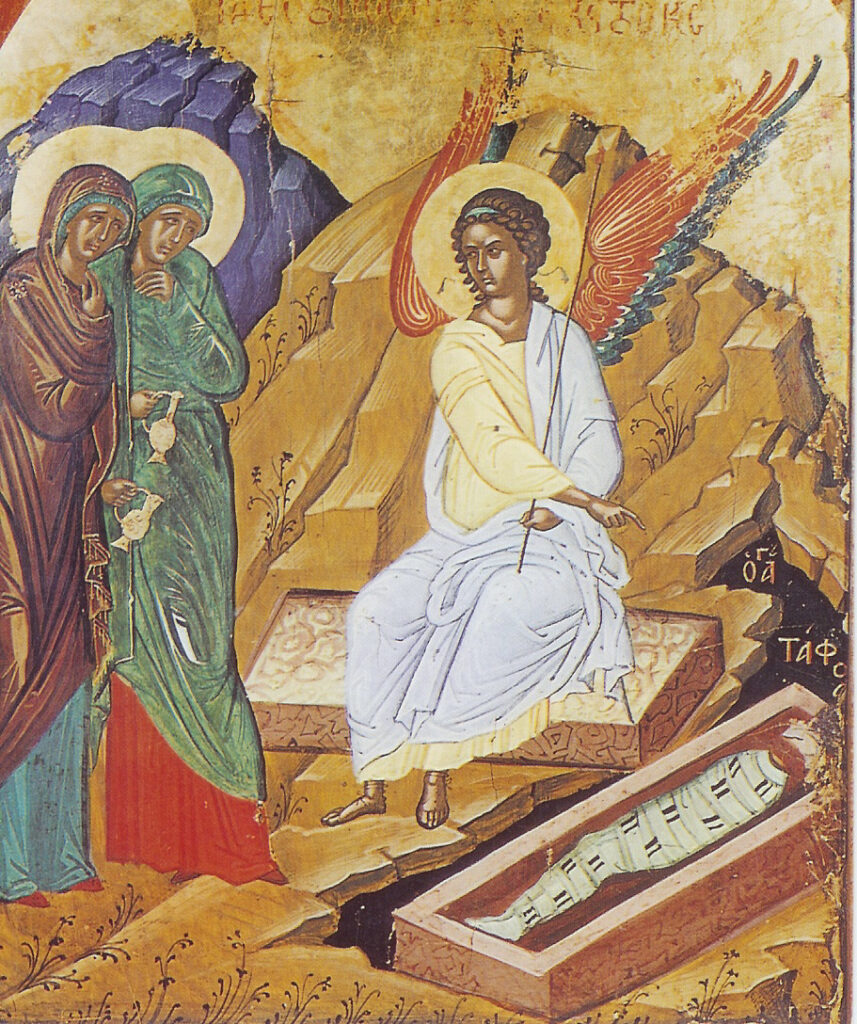In the name of the Father, and of the Son, and of the Holy Spirit, one God, Amen.
What, dear brothers and sisters in Christ, is the question when we have heard the Gospel? We have discovered that Christ is risen, that even death cannot hold him, and that he has defeated his enemies. And the Covenant he has sent out is different from any worldly king. A worldly king would say that we have had a change of ownership: we are no longer enslaved to the demonic powers of this age but had him as our new owner—our enslavement would continue. But Christ comes with freedom, Christ comes with joy, Christ comes and we are called to citizenship in the heavenly Kingdom where we may co-reign with him, Christ comes and says to the world, “Receive Life, abundant Life, Life which death cannot destroy nor corrupt.” What, then, is our response? What is the question when we have heard the Gospel?

A ruler phrased his question this way, “Good Teacher, what shall I do to inherit eternal life?” And this is a good way of putting it, of a response to the Gospel, “what shall I do to inherit eternal life.” And the Lord does not reject the question, he does not say “you should ask ‘What should I think to have eternal life?’” For our modern world has transformed Faith into opinions, knowledge, unsubstantiated assertions. But the question is on point, “What actions should I do in order to show my fidelity so I may inherit eternal life?”
And the Lord gives the Law inscribed in every human heart (see Romans 2:14–15), “Do not commit adultery, Do not kill, Do not steal, Do not bear false witness, Honour your father and mother.” These we should do because deep down we all know—whether we have heard the Gospel or not, whether we have come to be faithful to the Resurrection or reject it—that these are important, essential even, for all human beings.
But the ruler wants more. He has observed all these things from his youth. He is looking for the Gospel, looking—even before the Resurrection of Christ—for the Church, for salvation. “One thing you still lack,” says the Lord, “Sell all that you have and distribute it to the poor, and you will have treasure in heaven; and come, follow me.” And he says the same to me, “Sell all that you have, and come, follow me.” “Give up your possessions, what ties you to this fallen world and come, follow me.” And I baulk, and I squirm, and I writhe. I like my possessions, yet I am tied to my wealth and I am owned by what I have. I am possessed by my possessions and wealth means more to me than poverty, security more than instability, health more than sickness.
And so I must repent. I must recognise that all I have is not mine—I am a mere steward and I must make an account for my stewardship before the Lord. I must give away what I have freely, my time, my talents, my money, my energy, I must give them to God and give them to my neighbour. I must stand beside not the oppressor but the oppressed. And then I would be worthy to inherit eternal life.
My dear brothers and sisters in Christ, if we are to be worthy of the name Christians we must give freely to those who are in need. To those who are hungry, food; to those who are thirsty, drink; to those who are in poverty, money; to those who are lonely, time and attention. Let us rise to this high calling, let us set our sights on eternal life, let us—dear brothers and sisters—be Christians.
To our incarnate, crucified and risen Lord, God and Saviour Jesus Christ be all glory, honour and majesty, together with his unoriginate Father and the All-holy, Good and Life-giving Spirit. Amen.
Brethren, I, a prisoner for the Lord, beg you to lead a life worthy of the calling to which you have been called, with all lowliness and meekness, with patience, forbearing one another in love, eager to maintain the unity of the Spirit in the bond of peace. There is one body and one Spirit, just as you were called to the one hope that belongs to your call, one Lord, one faith, one baptism, one God and Father of us all, who is above all and through all and in all. But grace was given to each of us according to the measure of Christ’s gift.
— Ephesians 4:1–7
At that time, a ruler came to Jesus and asked him, “Good Teacher, what shall I do to inherit eternal life?” And Jesus said to him, “Why do you call me good? No one is good but God alone. You know the commandments: ‘Do not commit adultery, Do not kill, Do not steal, Do not bear false witness, Honor your father and mother.’ ” And he said, “All these I have observed from my youth.” And when Jesus heard it, he said to him, “One thing you still lack. Sell all that you have and distribute it to the poor, and you will have treasure in heaven; and come, follow me.” But when he heard this he became sad, for he was very rich. Jesus looking at him said, “How hard it is for those who have riches to enter the kingdom of God! For it is easier for a camel to go through the eye of a needle than for a rich man to enter the kingdom of God.” Those who heard it said, “Then who can be saved?” But he said, “What is impossible with men is possible with God.
— Luke 18:18–27
